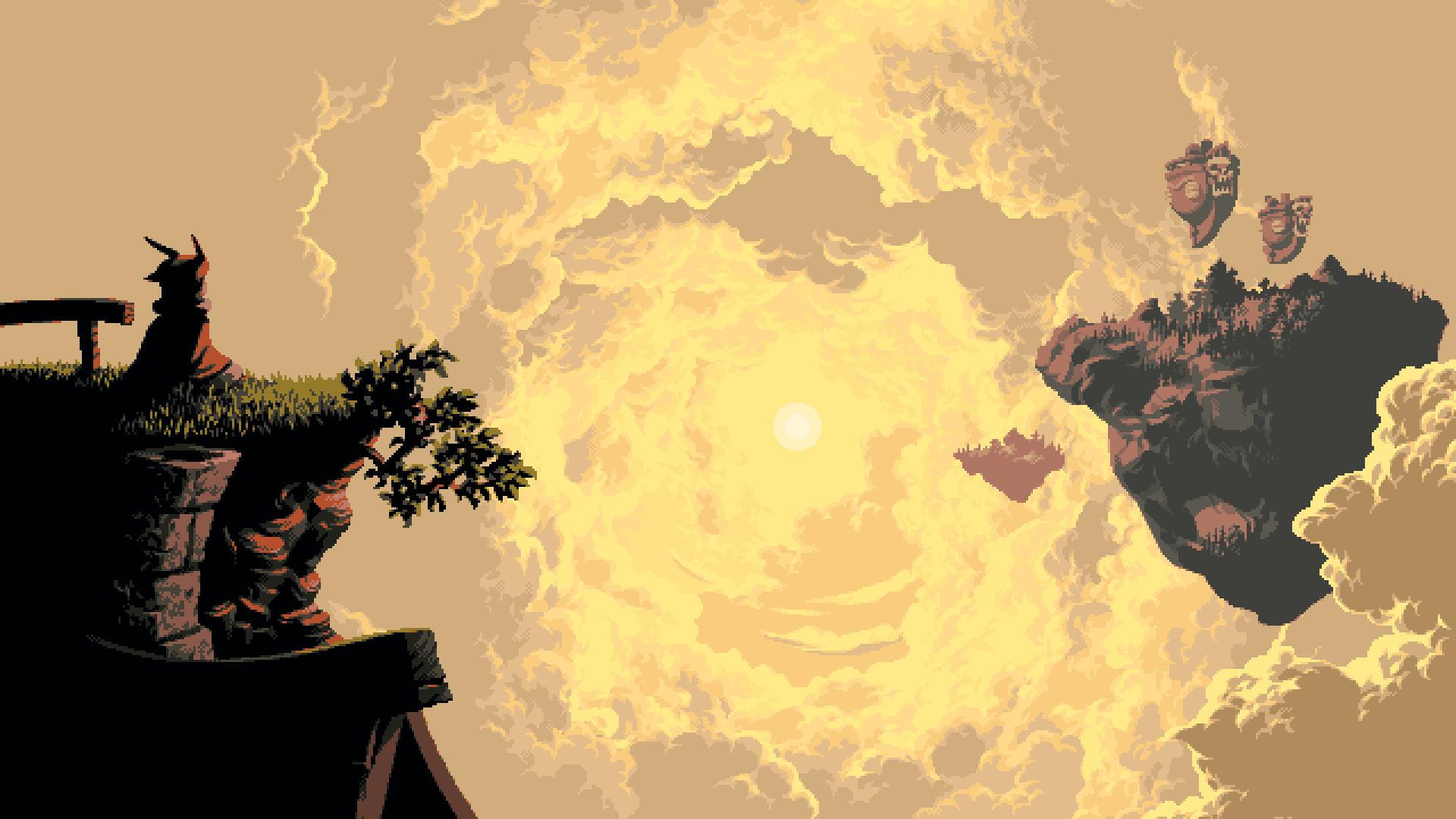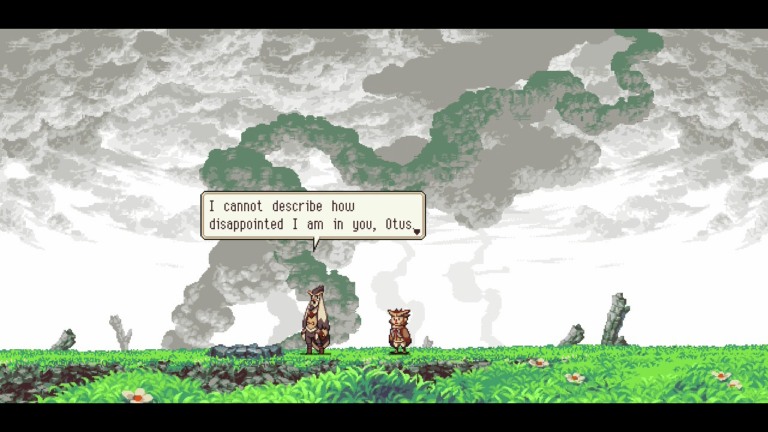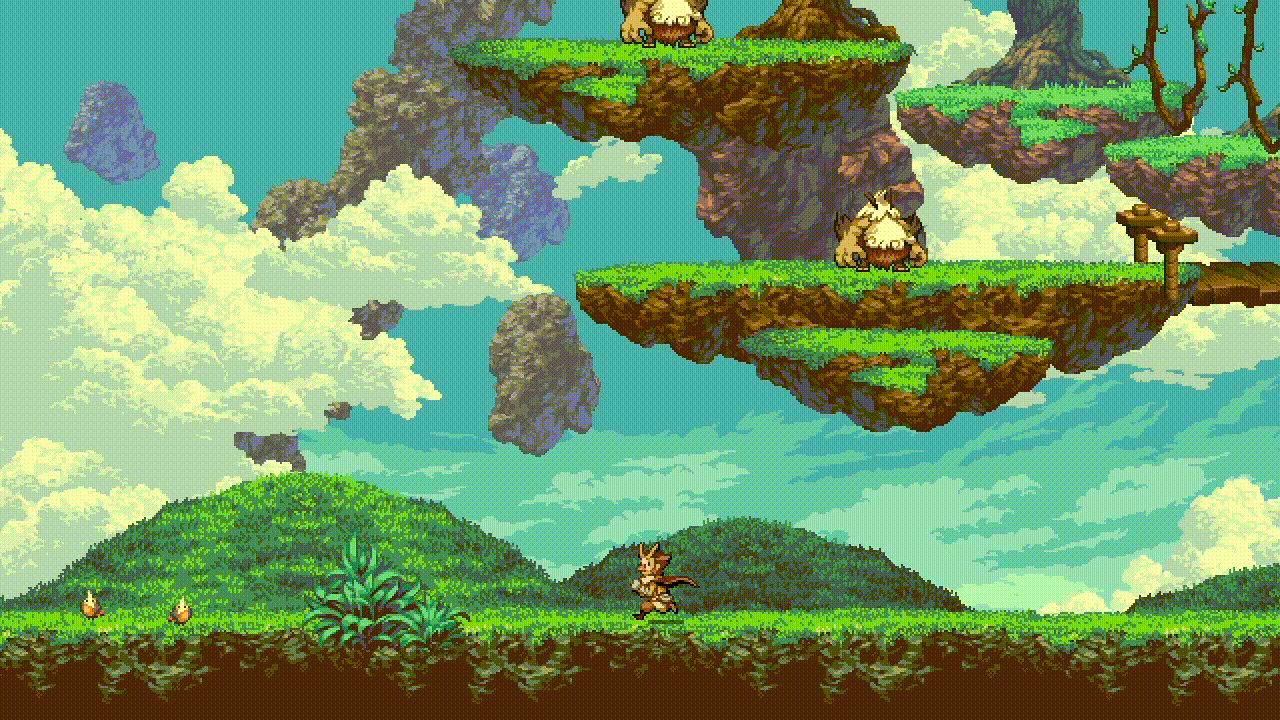I have a confession to make: I was a pretty shy kid. As anyone previously bound by crippling silence in their formative years will later tell you, this communication barrier colors your interactions with people in the strangest ways. In my case, I quickly came to realize that there are two kinds of people–ones who take your silence as a negative and project their feelings upon you, and those who attempt to find the person, and meaning behind it. The latter are the people who would eventually become my friends, and before I knew it a small, inseparable group of us had formed. Through them, I learned early on that who you are isn’t set in stone, and that you can grow through the positive relationships you form with others.
I know, you’re probably asking yourself: What does this have to do with a 2D platformer starring a human/owl hybrid?
Well, in Owlboy‘s opening moments, I unexpectedly saw myself, my friends, and the thrill of embarking upon an adventure previously bound by imagination.
Projection Lens
Owlboy begins as any hero’s journey would, in the small town of Vellie. After being introduced to the prestige of the human-hybrid Owl race via a smattering of on-screen text, we are introduced to Otus, an owl apprentice training under his mentor, Asio. To say it doesn’t go well is an understatement. In your average game, the tutorials are the moments where you would normally acclimate yourself to interacting with the world, but here, you’re also being introduced to the way the world interacts with Otus. Being mute, his actual feelings are always at odds with how other characters choose to interpret and project upon him, and since he doth protest not, the following series of one-sided interactions feel crushing in context. By the time he’s literally walking through the spectre of his own social anxieties, Otus’ life experience thus far becomes crystal clear, and it isn’t all rainbows.
This introduction, though unusually harsh (with a dash of bleak) for this kind of game, is crucial to putting you into Otus’ shoes in a very real way that few games attempt. Usually, the silent protagonist is used as a very convenient means for players to project onto the main character, but Owlboy dodges that cliche by making Otus a compelling character in his own right from the beginning. By knowing just how much he feels despite being unable to utter a single word, you’re able to connect with him, not just in spite of him. When his town becomes overrun by pirates willing to tear his town to pieces for an ancient relic, and he has to rise to the occasion and prove himself, it doesn’t seem out of place at all. It’s something you want to see him accomplish because you believe in him.
Buddy System
This strength in storytelling extends even to the characters you’ll meet over the course of the story. Though you’ll meet a number of eccentric and fun characters over the course of this 10+hour game, the spotlight has more than enough room for all of them due to some sharp writing. Their diverse (and occasionally eccentric) personalities not only compliment Otus’ in ways that strengthen the story, but they also expand Otus skillset in very meaningful ways. For example, on a storytelling level, his best friend Geddy has a short fuse and speaks his mind in lieu of Otus’ silence, but he also carries a pistol that gives Otus some offensive range. Others introduce elements like a grappling hook to pass waterfalls Otus cannot fly through, or a flamethrower that burns away vines blocking your path.
Since Otus has little offensive abilities on his own outside of a spin that acts as a get-out-of-jail-free card, his buddies when doubled up with him lend the game some welcome variety in gameplay. This gives Owlboy two distinct identities as a platformer and dual-stick shooter. The end result is a platform game that never feels like its trading on styles, but reveling in them. The ability to fly lends itself well to the vertical nature of the world, which means levels are as tall as they are wide, and puzzles tend to use every mechanic at your disposal. There’s rarely a moment when you encounter a problem with no immediate solution, and the few secrets the game does choose to withhold are always satisfying when they’re finally uncovered.
Pixel Perfect
It isn’t difficult to see where the past 8 years of Owlboy’s development went, because even in a static screenshot, the game is gorgeous. In motion, the game resembles an Osamu Tezuka or Studio Ghibli production with a level of per-pixel detail to make Paul Robertson jealous. There isn’t a wasted frame anywhere, and is a great example of why 2D will never go out of style, no matter how close we get to the uncanny valley on more powerful hardware. Characters are expressive and emote heavily to down their facial expressions. Every new location you encounter is filled to the brim with vibrant personality, from the detailed clouds in the background framing Vellie’s numerous, lush floating islands and windswept grass, to the ominous and cold emptiness of the Owl temple.
There was very little about Owlboy that I didn’t like, and very little about the game that didn’t leave me with a smile on my face throughout its running time.
The visuals aren’t just there to awe you, either. While night/day cycles and realistic lighting aren’t anything to write home about in a 3D game, seeing it in a game comprised entirely of hand-crafted pixel art is something special, especially when it’s used to the game’s advantage. A few hours in, a later section of the game has you anxiously rushing to keep torches in a cave lit while keeping creatures at bay. All the while, subtle shifts in the lighting as you leave the torches behind, the walls closing in as you get further from the light. It’s great stuff.
If I failed to mention the soundtrack tying it all together up until this point, I’m only saving the best for last. Jonathan Geer, through the use of what I can only describe as orchestrated chiptunes, has crafted a soundtrack with so much life and energy, it’s hard to imagine the game without it. It soars when it needs to during one of the game’s many setpieces, but can just as easily dial it down to an appropriate level during moments that require it. The story at times runs a gamut of emotions in a single scene, and somehow, the music was always appropriate.
Just hearing the Tropos theme for the first time, it filled me with so much delight and inspiration to adventure that I ironically never wanted to leave.
Mr. Owl, How Many?
There was very little about Owlboy that I didn’t like, and very little about the game that didn’t leave me with a smile on my face throughout its running time. The characters are unique and endearing, the platforming finely tuned and filled with heaps of gameplay variety, and the presentation was stellar. Aside from an attempt at world-building in the latter half that may or may not fall flat depending on how obsessively you collect the game’s many hidden coins, I found the story was as consistently entertaining as the gameplay from start to finish.
Even if I found Owlboy to be definitely more about the journey than the destination, a slight misstep in the conclusion isn’t nearly enough to ruin everything D-Pad Studio has accomplished here. Owlboy is a fine adventure, and in many ways an artistic and technical achievement that absolutely justifies the wait.
Developer: D-Pad Studio
Platforms: PC, Xbox One, PS4, Nintendo Switch (Reviewed)
Website: owlboygame.com




